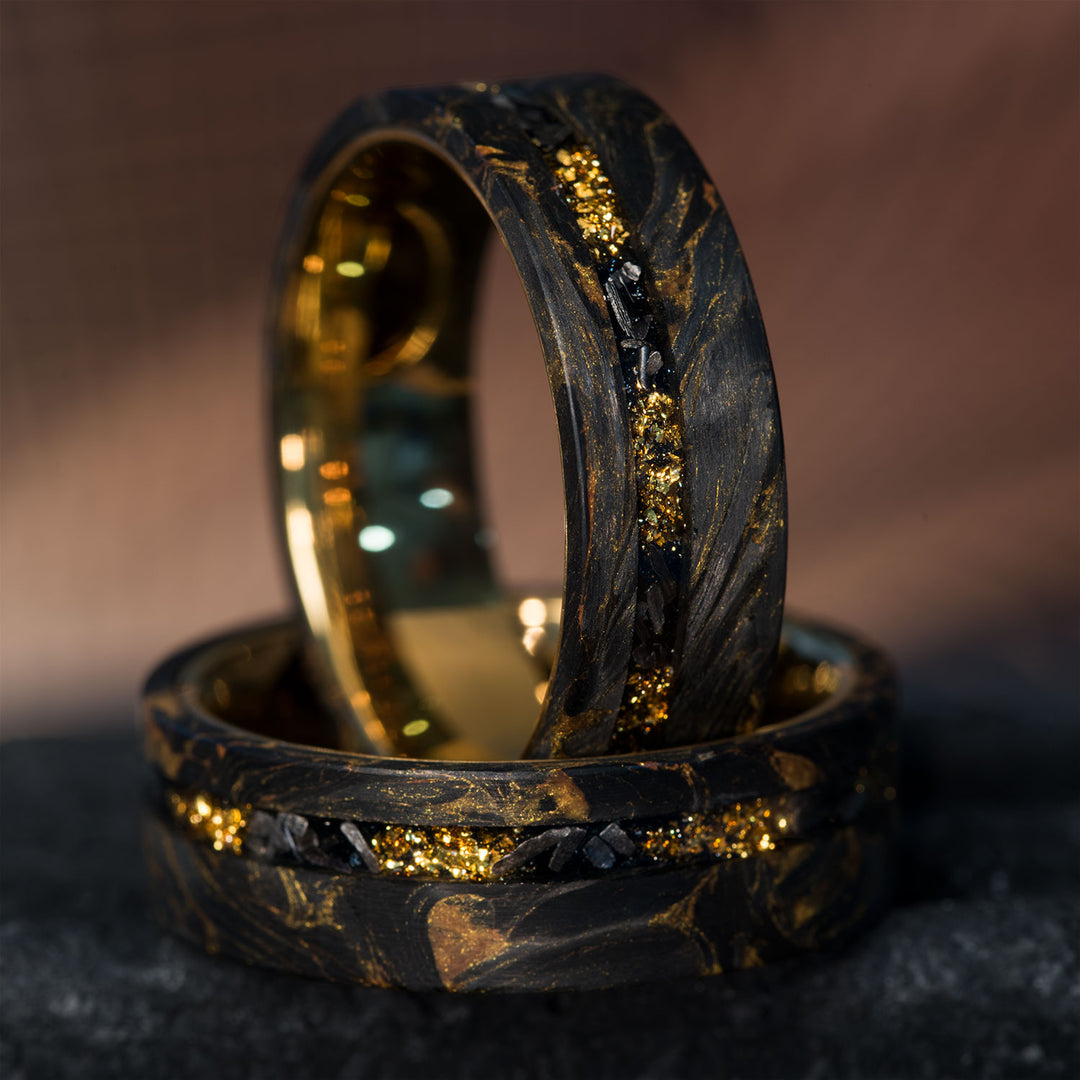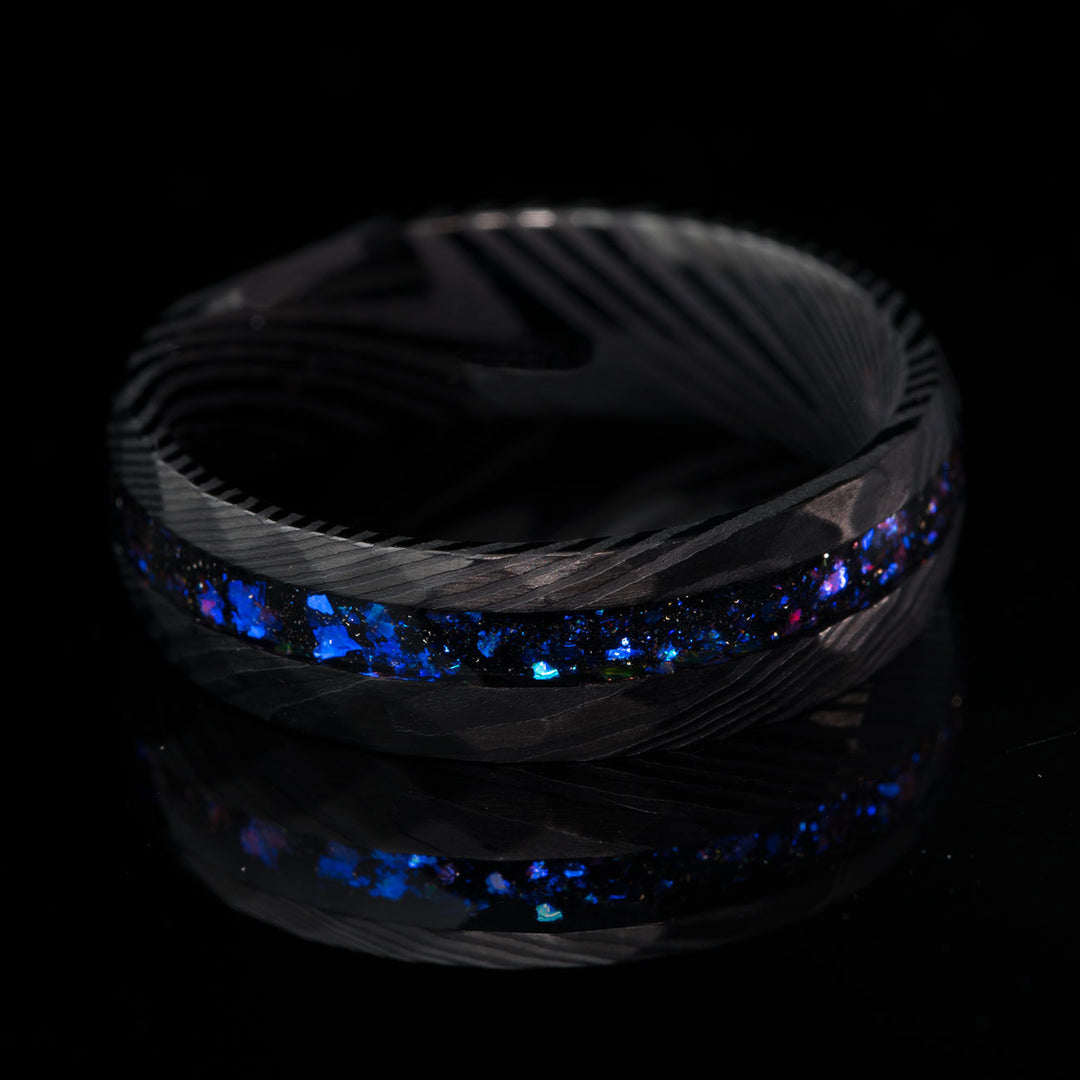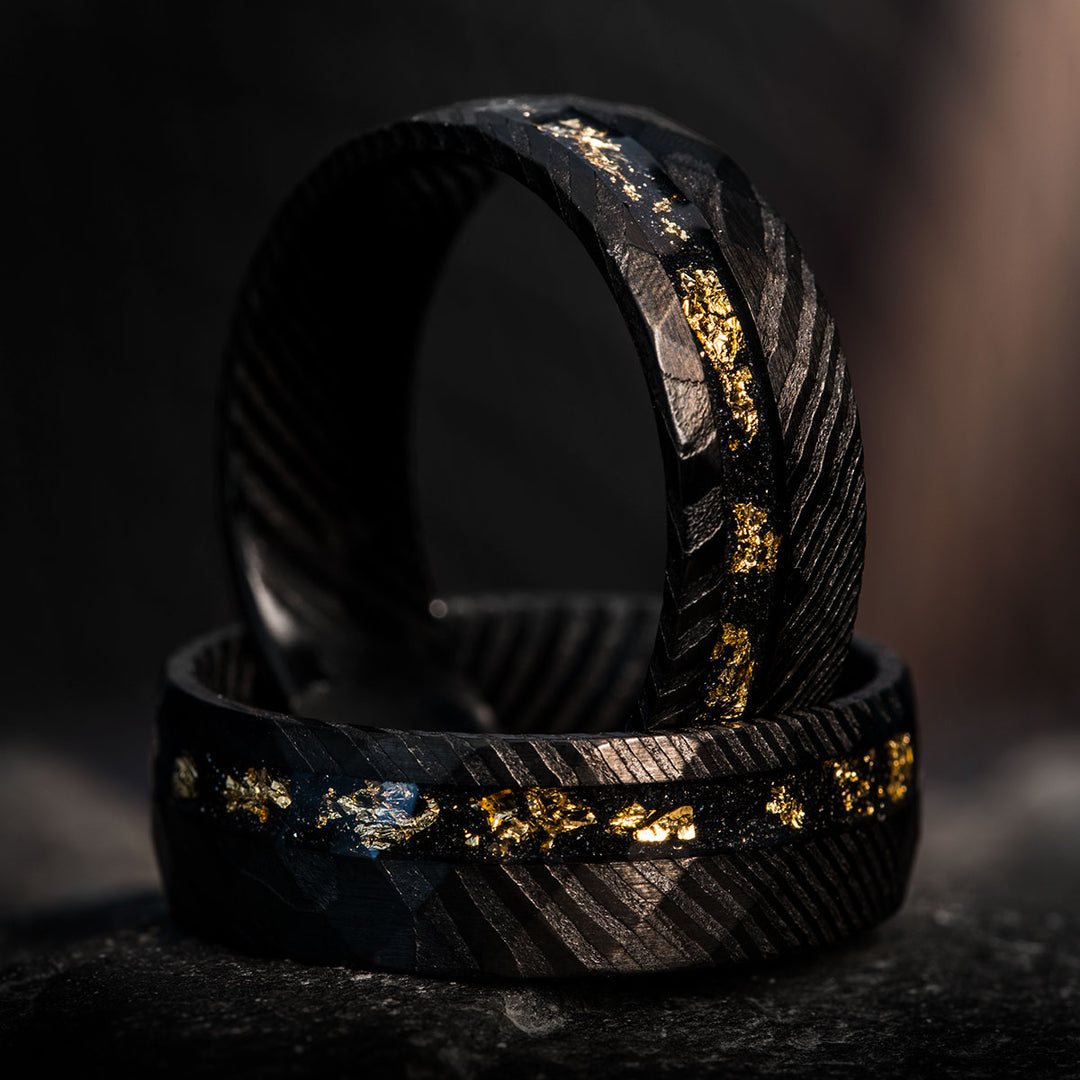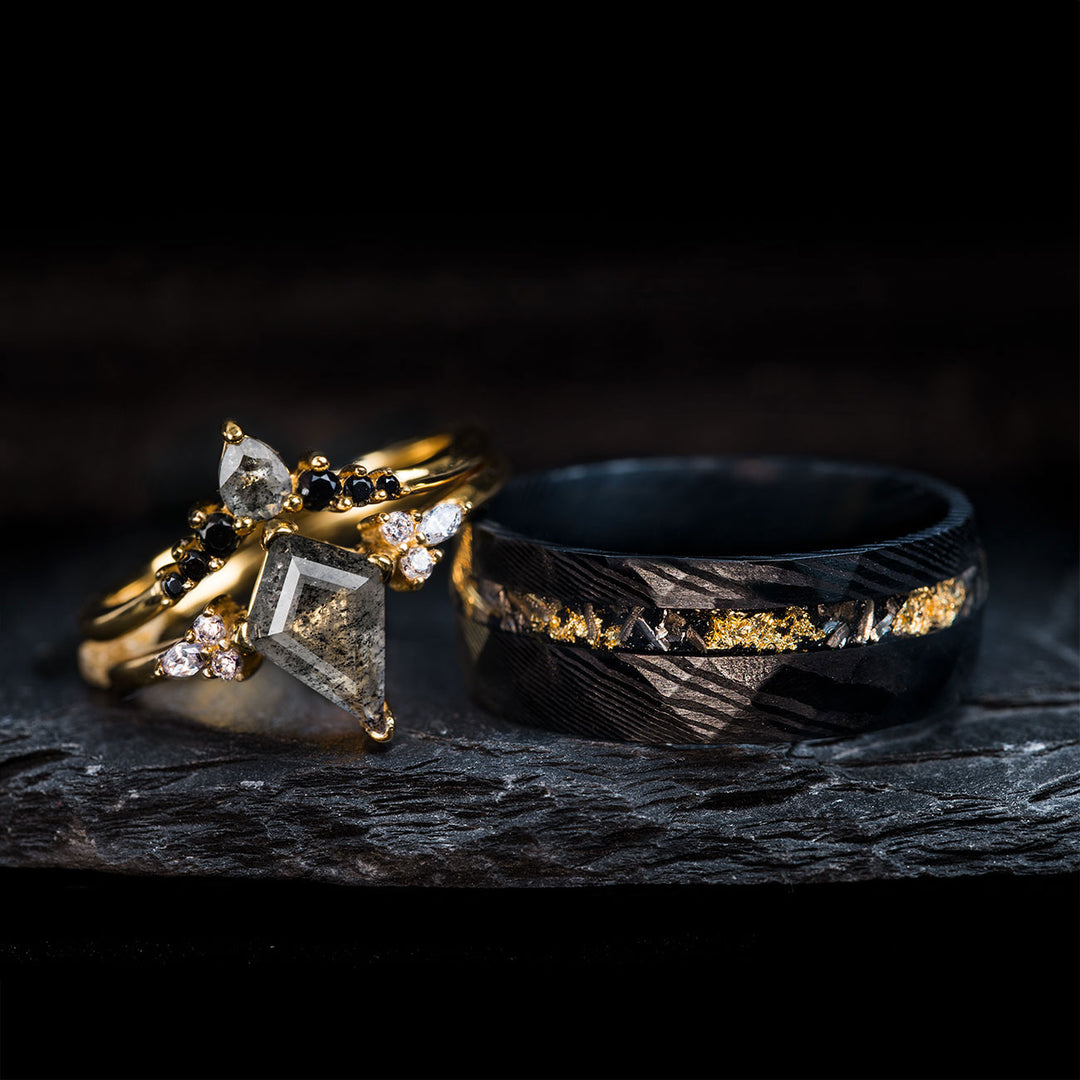| Metal | Relative Price | Durability (Pros) | Durability (Cons) | Resizable? | Feel (Weight) | Key Maintenance | Hypoallergenic? |
| Gold | Premium | Bends, doesn't crack. | Soft; scratches and dents easily. | Yes (Easy) | Medium | White gold requires rhodium re-plating. | Depends on alloy. |
| Platinum | Most Expensive | Very durable; holds stones securely. | Scratches (forms a "patina"). | Yes (Difficult) | Very Heavy | Low (polishing only). | Yes |
| Tungsten | Affordable | Virtually scratch-proof. | Brittle; can crack or shatter if dropped. | No | Heavy | Very Low (stays polished). | Yes (Usually) |
| Titanium | Affordable | Very strong; corrosion-resistant. | Not scratch-proof (will show scuffs). | No | Very Light | Very Low. | Yes |
| Palladium | High | Durable; naturally white color. | (Not specified) | Yes (Very Difficult) | Medium-Light | Low (like platinum). | Yes |
| Damascus Steel | (Not specified) | Very strong; unique patterns. | Can be prone to rust. | No | Medium | High (requires occasional oiling). | No |
| Silicone | Very Low | Flexible; safe for active jobs. | Not a "forever" or precious ring. | N/A | Very Light | Low (washing). | Yes |
Wearing a wedding ring every day is a sign of your love. Since you'll be wearing it all the time, it needs to be durable enough for you. A lot of couples choose a ring based on how it looks, but the metal is the most important thing for long-term happiness.

Why the Metal is Your Most Important Choice
Your ring's weight, durability, and appearance all depend on the metal. Knowing the differences helps you find a ring you'll love for years.
Durability and Wear
Soft metals like gold will show scratches. Hard metals like tungsten look new for decades. But hardness has a trade-off. A hard metal like tungsten can crack if dropped on tile, while a soft metal like platinum just bends.
Aesthetics and Feel
This is a personal choice. Do you like the heavy, substantial feeling of a ring, or do you want something so light you forget it's there? Platinum and tungsten are very dense and heavy. Titanium is famous for being feather-light. Color is also a major factor. Platinum is naturally white. White gold is not—it's yellow gold mixed with alloys and plated with rhodium to look white, which means it will need re-plating.
Maintenance and Long-Term Cost
A bright white gold ring might seem like a good value upfront, but it requires a trip to the jeweler every few years for re-plating. Platinum costs more initially but only needs polishing. Some unique metals, like Damascus steel, may even need occasional oiling to prevent rust.
Resizability and Adjustments
Life changes, and so do our bodies. Traditional metals like gold and platinum can be resized by almost any jeweler. Modern metals like tungsten, titanium, and ceramic are so hard that they cannot be resized. If your finger size changes, you will need to get a new ring.
These four points will help you narrow down your options fast. Knowing if you need durability or resizability makes the choice much clearer.
The Traditional Precious Metals for Wedding Bands
These are the classics you'll find in every jewelry store window. They have a long history, hold their value, and are the standard for fine jewelry for a reason.
Gold (Yellow, White, and Rose)
Gold is the timeless choice. Its warmth and shine are iconic. You'll hear it discussed in "Karats" (k). This term refers to purity, not size.
- 24k is pure gold, but it's far too soft for jewelry.
- 18k (75% gold) has a deep, rich color but is still quite soft.
- 14k (58.3% gold) is the most popular mix, offering a great balance of rich color and durability.
Pros:
- It's the classic, traditional look.
- It holds its value well over time.
- It comes in three distinct colors (yellow, white, rose) to match any style.
- It's the easiest metal to resize and repair.
Cons:
- It's a soft metal. It will scratch, scuff, and dent.
- White gold needs its rhodium plating redone every 1-3 years to stay bright white, which is a maintenance cost.
Platinum
This is a top-tier precious metal. It's a naturally white metal that is dense, durable, and prestigious.
Pros:
- It's extremely durable and strong, holding stones securely.
- It is naturally hypoallergenic, making it the best choice for sensitive skin.
- Its white color will never fade.
Cons:
- It's the most expensive option.
- It's also very heavy, which some people love, but others find cumbersome.
- Platinum does scratch, but the metal isn't lost (like it is with gold); it just moves, creating a unique matte finish called a "patina" that many people prize.
If you care about tradition and want to be able to change the size of your ring later, these wedding bands are great for you. They need some care, but it's undeniable that they are classics.

Modern and Durable Alternative Metals for Wedding Bands
If your top priority is toughness, or you just want a more modern look, these metals are for you. They perform amazingly well and are a very common choice for men's wedding bands.
Tungsten Carbide
This is the champion of scratch resistance. Tungsten carbide is an industrial-strength compound that is incredibly hard.
- Pros: It is virtually scratch-proof. A polished tungsten ring will look just as shiny 20 years from now. It's very affordable and has a satisfying, heavy weight similar to platinum. The popularity of men's tungsten wedding rings has soared because they offer this premium feel without the premium price.
- Cons: It cannot be resized. At all. It's also brittle. Because it's so hard, it doesn't bend—it breaks. If you drop it hard on a tile floor, it can crack or shatter.
Titanium
Titanium is tungsten's opposite in one key way: it's famous for being feather-light.
- Pros: It's incredibly lightweight—many people say they barely feel it. It's also very strong, corrosion-resistant, and hypoallergenic. Like tungsten, it's very affordable.
- Cons: It cannot be resized. While it's tough, it's not scratch-proof; it will show scuffs (though they are often a dull gray and not as obvious as on gold). It can be difficult to cut off in an emergency.
Palladium
Palladium is a "sister metal" to platinum. It's in the same family but is less dense.
- Pros: It has the same naturally white, non-fading color as platinum. It's also hypoallergenic. It's lighter than platinum (closer to gold) and less expensive.
- Cons: It's still a precious metal, so it's more expensive than gold. Not all jewelers have the equipment to work with or resize palladium.
These metals are built for an active life, but you must be certain of your ring size. Their high performance comes with the permanent trade-off of not being resizable.

Unique Lifestyle and Niche Metals for Wedding Bands
For the person who wants their ring to be a true conversation starter, these materials are all about personal expression.
Damascus Steel
This metal is known for its pattern. It's made by forging two or more types of steel together, creating unique, swirling patterns that look like wood grain.
- Pros: Every ring is completely unique. It's very strong and has a rugged, masculine look.
- Cons: It cannot be resized. It is not hypoallergenic. Because it's steel, most varieties (especially non-stainless ones) can be prone to rust and may require occasional oiling and care.
Silicone
These flexible rubber rings have become extremely popular, often as a second ring.
- Pros: They are extremely cheap, flexible, and safe. They're perfect for wearing to the gym, on vacation, or in jobs (like construction or electrical work) where a metal ring would be dangerous.
- Cons: It's not a "forever" or precious ring. It's a practical, temporary stand-in for your primary wedding bands.
Wood, Ceramic, or Meteorite
These are often used as inlays in one of the metals listed above.
- Pros: They offer a highly personal, unique, and stylish look.
- Cons: They are not as durable. Wood can swell or crack with water exposure. Ceramic is hard like tungsten but also brittle and can shatter. These materials cannot be resized and require special care.
These options prioritize a unique style. They require you to accept their specific weaknesses and care instructions.
How to Filter Your Wedding Band Metal Options and Decide
You have seen all the options. You can use these five points to narrow your choices and find the perfect fit.
- Your Lifestyle: Are you a weightlifter, a gardener, or a mechanic? You should look at tungsten, titanium, or silicone. If you work in an office, gold or platinum is a great fit.
- Your Budget: If you have a firm budget, tungsten and titanium offer incredible value. If you are investing for the long haul, platinum and gold are the premium choices.
- Your Style: Do you want a heavy or light ring? Do you prefer a bright white, a warm yellow, or a modern dark gray?
- Your Tolerance for Maintenance: Do you want a ring you never have to think about? Avoid white gold (needs re-plating) and Damascus steel (needs oiling). Platinum and tungsten are very low-maintenance.
- Your Skin: If you have sensitive skin or metal allergies, your safest bets are platinum or titanium.
Balancing these five points will lead you to the right metal. This process helps you decide what you're willing to trade off and what you value most.
Find Your Right Wedding Band Metals
This information can only get you so far. You need to go to a jeweler and try them on. Feel the surprising lightness of a titanium ring. Feel the significant, satisfying weight of a platinum or tungsten ring. See how the different colors look against your skin. Your personal comfort is the final and most important factor in choosing a ring you'll be happy to wear for a lifetime.
FAQs
Q1: How is a titanium or tungsten ring cut off in an emergency?
Emergency medical professionals are trained to remove hard-metal rings. Titanium bands can't be cut with regular ring cutters. A bolt cutter or a specialized diamond-tipped saw is usually used to take them off. Tungsten rings are not cut at all. Since they are fragile, they are taken off by applying pressure with a vice-grip tool. This makes the ring crack and break apart safely.
Q2: Does the wedding band have to match the engagement ring?
There's no rule that says the wedding band has to match the engagement ring exactly. A lot of people choose "mismatched" sets, which pair pieces of different metals, colors, or styles. A pavé diamond engagement ring can be paired with a simple, shiny metal band, or a vintage-style ring can be paired with a simple modern band. The choice is completely up to the person wearing it, and it should match their own style.
Q3: Can a person be allergic to titanium or tungsten?
Even though both are thought to be hypoallergenic, allergies are still possible, though very rarely. Titanium is often used in medical devices because it is so biocompatible and inert. Most tungsten carbide bands are safe, but some may use nickel as a binder alloy, and nickel is known to cause allergies. If you are allergic to nickel, you should only buy rings from reputable jewelers who can say for sure that the rings are "nickel-free."









